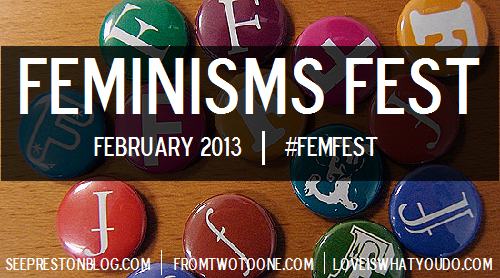When I heard that Preston Yancey, Danielle Vermeer, and J.R. Goudeau were hosting a three-day blog link-up discussing feminism, my first thought was “Damn this timing.” See, I was planning on dedicating these very three days to finishing the literature review for my senior research project.
So, yesterday I was too busy to contribute because I was staring at a blank Microsoft Word document thinking “Fuck it, I’m going to go watch Fullmetal Alchemist.”
Tomorrow, I’ll probably be too busy to contribute because I have stayed up all night writing my literature review to make up for the time I spent writing today (and watching anime yesterday).
But today? Today, I’ll be doing my part. Wasn’t planning on it, but I couldn’t stay away.
You see, my project is on how rape and sexual assault are handled in four different Christian dating books (spoiler alert: not very well), and so I’ve been researching cultural attitudes toward rape and rape victims.
As I studied and the facts popped out at me…
“25% and 35% of respondents (both male and female) agree with the majority of these rape myths”*
“…Although individuals are not likely to directly blame a female rape victim, 53% of college students agreed that her actions led to her assault.”*
“In a study conducted at a Christian liberal arts college, men higher in religiosity…compared to less religious men were more likely to believe that women who are promiscuous or who dress in a provocative manner deserve to be raped.”*
“Qualitative analyses demonstrated that clergy take into account the woman’s resistance, provocative behavior, decision making, marital role, and unusual behavior when assigning responsibility for rape. The results indicated that most clergy blame the victim and adhere to rape myths.”**
…I realized that all of these quotes are why we need feminism. Why I need feminism.
A common stereotype about feminists is that we hate men. Feminism causes that hatred, according to these stereotypes. And I’d like to admit something.
I used to hate men.
…before I became a feminist.
And why not?, I think to myself as I research for my project and read about the rape that occurs and the public attitude toward it. Why not hate men?
The world is not just. And, according to bell hooks, “without justice there can be no love.”
Before I became a feminist, before I began to demand justice, in my politics, in my churches, and in my relationships, I could not love men. And the men in my life who were upholding patriarchal traditions–often without even knowing it–could not really love me.
Now, I must add that I don’t think one has to identify as a feminist in order to love or be loved. I’m simply telling my own story.
But I agree with hooks that there can be no love without justice. Where unfairness, inequality, abuse, disrespect, victim-blaming, and rape exist, there is no love.
And feminism is one movement that fights for justice for women.
So why feminism?
Love. That’s why.
I wrote in my last post that a man at a Christian college that I went to believed that relationships between men and women–romantic relationships, friendships, parent-child relationships, etc.–were broken. He believed that they were broken because of women not adhering to gender roles.
I agree with this man on one thing. Relationships between men and women are broken.
But they’ve been broken for a long time. Longer than second-wave feminism. Longer than suffrage. They’ve been broken for centuries and it’s not because of gender roles.
It’s because of injustice.
I want to love men because I want to live in a loving world. I want to love my fiance, yes. But also my brother, my father, my uncles, my cousins, and my coworkers and friends.
But I cannot do this when I fear them. I cannot do this when they exercise power over me or when they disrespect me. I cannot do this when they ignore their privilege and continually hurt me–whether intentionally or on accident–because of it. I cannot do this when they believe and perpetuate rape myths. I cannot do this when they are rapists or abusers themselves.
So I need feminism. Because I need justice, and without justice there can be no love.







